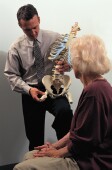
WEDNESDAY, April 25 (HealthDay News) — Women who go through menopause early are almost twice as likely to have the bone-thinning disease osteoporosis later in life, new research indicates.
In addition, researchers from the Skane University Hospital in Malmo, Sweden, noted that these women are also at greater risk for fracture and an increased death rate.
For the study, the researchers recruited 390 white women from northern Europe in 1977. The women, who were 48 years old at that time, were divided into two groups: those who went through menopause before the age of 47; and those who started menopause at age 47 or later. The women were followed for roughly three decades. All of the women had their bone mineral density measured.
After 29 years, only 198 women remained in the study due to deaths, relocation or lack of participation. By this point, the women were 77 years old. The researchers re-measured their bone density and found 56 percent of the women with early menopause had osteoporosis, compared with just 30 percent of those with later menopause.
The study also found the women who had early menopause were at greater risk for fragility fracture and death. The early menopause group had a mortality rate of 52 percent, compared to 35 percent among the women who had late menopause. The rate of fractures was also 44 percent among the women who had early menopause compared with 31 percent for women who had late menopause.
The study, led by orthopedic surgeon Dr. Ola Svejme, was published April 25 in BJOG: An International Journal of Obstetrics and Gynecology.
However, although the study uncovered an association between early menopause and osteoporosis, it did not prove a cause-and-effect relationship.
BJOG deputy editor-in-chief, Pierre Martin-Hirsch, pointed out that more research on the link between early menopause and bone disease is needed.
“The higher mortality rate in women with an early menopause needs to be explored further as many other factors could affect this such as medication, nutrition, smoking and alcohol consumption,” Martin-Hirsch said in a journal news release.
More information
The U.S. National Library of Medicine has more about menopause.

